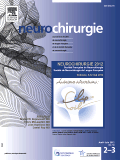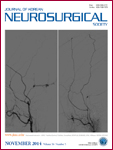
BRITISH JOURNAL OF NEUROSURGERY
Scope & Guideline
Connecting researchers and clinicians for impactful discoveries.
Introduction
Aims and Scopes
- Clinical Outcomes and Complications:
A core focus of the journal is on the clinical outcomes of neurosurgical procedures, including complications and recovery trajectories. This encompasses studies on post-operative care, long-term follow-up, and the effectiveness of various surgical interventions. - Surgical Techniques and Innovations:
The journal frequently publishes articles detailing novel surgical techniques, technological advancements, and procedural innovations. This includes the use of robotic assistance, endoscopic methods, and minimally invasive approaches. - Neuro-oncology:
Research in neuro-oncology is prominently featured, addressing the surgical management of brain tumors, including gliomas, meningiomas, and metastatic lesions. Studies often include prognostic factors and treatment outcomes. - Neurotrauma and Emergency Neurosurgery:
The journal covers the management of acute neurosurgical conditions, including traumatic brain injury, subdural hematomas, and cauda equina syndrome, focusing on emergency interventions and their outcomes. - Neurovascular Surgery:
There is significant emphasis on neurovascular topics, particularly the management of aneurysms, arteriovenous malformations, and other vascular pathologies, often discussing both surgical and endovascular techniques. - Pediatric Neurosurgery:
The journal includes a dedicated focus on pediatric neurosurgery, exploring conditions unique to this patient population, surgical challenges, and outcomes specific to children. - Neurosurgical Education and Training:
Articles discussing the training and education of neurosurgeons, including assessment methodologies, curriculum development, and the impact of training on clinical practice are also highlighted.
Trending and Emerging
- Minimally Invasive Techniques:
There is a growing trend towards research on minimally invasive surgical techniques, which aim to reduce recovery time and complications for patients. This includes endoscopic procedures and advanced imaging techniques that facilitate precision surgery. - Telemedicine and Remote Follow-up:
The integration of telemedicine and digital health interventions has gained traction, especially in the context of patient follow-up after surgery. This reflects broader healthcare trends driven by the COVID-19 pandemic. - Artificial Intelligence and Machine Learning:
Emerging applications of artificial intelligence and machine learning in neurosurgery are becoming a focal point, with studies exploring their potential to enhance diagnostic accuracy and improve surgical outcomes. - Patient-Centered Care and Quality of Life:
Research focusing on patient-centered care, including quality of life assessments post-surgery, is increasingly prominent. This trend highlights the importance of holistic approaches in neurosurgical practice. - Neurosurgery in the Context of Global Health:
There is an emerging interest in the impact of social determinants of health on neurosurgical outcomes, including studies that examine disparities in access to care and outcomes across different populations.
Declining or Waning
- Traditional Neurosurgical Techniques:
There is a noticeable decline in publications focused on traditional, well-established surgical techniques. As minimally invasive and robotic-assisted methods gain prominence, classic approaches may be less frequently reported. - General Case Reports:
The journal seems to have seen a reduction in the number of general case reports, particularly those that do not contribute new insights or perspectives on established practices. - Basic Neuroscience Research:
The focus on basic neuroscience research seems to be declining, as the journal increasingly prioritizes clinical and applied research that directly impacts surgical practice and patient outcomes. - Longitudinal Studies without Immediate Clinical Application:
There appears to be a decrease in the publication of longitudinal studies that do not provide immediate clinical application or actionable insights for neurosurgeons.
Similar Journals

NEUROSURGERY
Exploring the Depths of Neurosurgical Knowledge.NEUROSURGERY, published by Lippincott Williams & Wilkins, stands as a foremost journal in the field of clinical neurology and surgery, reflecting a commitment to advancing knowledge and practice through high-quality research and discourse. With an impact factor indicative of its scholarly significance and a remarkable Scopus ranking placing it in the Q1 category for both neurology and surgery, this journal provides a vital platform for clinicians, researchers, and students to explore cutting-edge developments and innovations. NEUROSURGERY publishes peer-reviewed articles that span the spectrum of neurosurgical practice, from basic science discoveries to clinical applications, fostering a collaborative exchange of ideas and methodologies. Since its inception in 1977, the journal has maintained a focus on delivering substantive research that informs practice and enhances patient care, making it an essential resource for professionals dedicated to the fields of neurology and surgery. The journal is based in India, and while it currently does not offer open access options, its rich archive from 1977 to 2024 ensures a comprehensive repository of knowledge for those engaged in this critical area of medicine.

Brain and Spine
Shaping the landscape of neuroscience through open-access knowledge.Brain and Spine is a premier academic journal published by ELSEVIER, dedicated to advancing the fields of neuroscience and neurology. With its unique focus on the complex interactions between brain function and spinal health, this journal serves as an essential resource for researchers, clinicians, and students alike. Though currently lacking an official impact factor, its ranking within Scopus highlights its relevance, placing it in the 25th percentile for neuroscience (miscellaneous) and the 23rd percentile within neurology, indicating that while it is a developing journal, it holds potential for significant contributions to the field. Operating under open-access principles, it aims to disseminate valuable findings widely, ensuring that novel insights into neurological health are accessible to a global audience. Brain and Spine seeks to foster interdisciplinary collaboration and innovation, making it an invaluable platform for those striving to enhance our understanding of the brain and spinal cord's intricate functions and interdependencies.

Neurochirurgie
Advancing the Frontiers of NeurosurgeryNeurochirurgie, published by MASSON EDITEUR, stands as a prominent peer-reviewed journal in the fields of neurology and surgery, reflecting its commitment to advancing clinical practices and surgical innovations. With an impressive history dating back to 1955 and a convergence period extending to 2024, this journal serves a vital role in disseminating comprehensive research and updates relevant to both medical practitioners and researchers. Neurochirurgie holds a respectable Q3 ranking in clinical neurology and a Q2 ranking in surgery as of 2023, positioning it within the upper echelons of medical journals; its Scopus rankings further underline its growing influence, particularly in the surgical domain. Despite its non-open access model, the journal offers a platform where high-quality, rigorously vetted studies can be accessed, fostering an environment of knowledge exchange that is essential for the ongoing development of neurosurgical practices. For researchers, professionals, and students alike, Neurochirurgie presents an invaluable resource for staying at the forefront of neurological research and surgical advancements.

Egyptian Journal of Neurosurgery
Empowering Neurosurgeons with Cutting-Edge ResearchWelcome to the Egyptian Journal of Neurosurgery, a leading publication in the field of neurosurgery, meticulously curated by SPRINGERNATURE. With an E-ISSN of 2520-8225, this journal has been committed to advancing the understanding of neurosurgical practices since embracing Open Access in 2018, ensuring widespread accessibility of groundbreaking research and clinical insights. Based in London, England, at CAMPUS, 4 CRINAN ST, LONDON N1 9XW, the journal aims to bridge gaps in neuroscience research, providing a platform for innovative studies, systematic reviews, and case reports. By publishing high-quality, peer-reviewed articles, the Egyptian Journal of Neurosurgery aims to equip researchers, professionals, and students with the knowledge and tools necessary to enhance patient care and outcomes in neurosurgical practices globally. Join our vibrant community of scholars dedicated to exploring the complexities of the brain and spine, and contribute to the evolving narrative of neurosurgery.

Journal of Korean Neurosurgical Society
Shaping the Landscape of Neurosurgical Knowledge GloballyThe Journal of Korean Neurosurgical Society, with its ISSN 2005-3711 and E-ISSN 1598-7876, stands as a paramount resource in the field of neurosurgery, bridging clinical practice and cutting-edge research in both neurology and multidisciplinary neuroscience. Published by the Korean Neurosurgical Society, this open-access journal has been committed to disseminating invaluable knowledge to the global scientific community since its establishment in 1972. Located in Seoul, South Korea, the journal underscores its prominence with impressive quartile rankings—Q3 in Neurology (Clinical), Q3 in Neuroscience (Miscellaneous), and Q2 in Surgery for 2023. Its standing in Scopus rankings further emphasizes its impact, with a ranking of #195/551 in Medicine: Surgery and #235/400 in Medicine: Neurology (Clinical). By fostering a platform for innovative findings and advancements in surgical techniques, the Journal of Korean Neurosurgical Society aims to support professionals, researchers, and students alike in their pursuit of excellence and knowledge in neurosurgery and related fields, ensuring a brighter future for patient care and scientific inquiry.

Journal of Neurological Surgery Reports
Elevating standards in the field of neurological surgery.The Journal of Neurological Surgery Reports, published by GEORG THIEME VERLAG KG, serves as a pivotal platform for groundbreaking research in the field of neurological surgery. As an Open Access journal since 2012, it ensures that vital findings are accessible to a global audience, thereby promoting knowledge sharing and collaboration among researchers, clinicians, and students alike. With an ISSN of 2193-6358 and an E-ISSN of 2193-6366, this journal consistently ranks within the 41st percentile in the field of Medicine & Surgery and the 26th percentile in Medicine & Neurology (Clinical) according to Scopus, highlighting its commitment to quality and relevance. The journal's focus encompasses a wide spectrum of topics within neurological surgery, encouraging submissions that advance understanding and treatment of neurological conditions. By fostering a rich scientific discourse, the Journal of Neurological Surgery Reports plays an essential role in shaping the future of neurological healthcare.

Brazilian Neurosurgery-Arquivos Brasileiros de Neurocirurgia
Advancing Neurosurgical Knowledge GloballyBrazilian Neurosurgery-Arquivos Brasileiros de Neurocirurgia, published by GEORG THIEME VERLAG KG, is a distinguished peer-reviewed open access journal that has been making significant contributions to the field of neurosurgery since its transition to open access in 2015. This Brazilian journal, which is accessible to a global audience, aims to disseminate high-quality research articles, reviews, and case reports that enhance the understanding and practice of neurosurgery and clinical neurology. Despite its current ranking in the Q4 category for both neurology and surgery in 2023, the journal is committed to improving its impact and accessibility for researchers, medical professionals, and students worldwide. As an important platform for innovative ideas and discussions, it takes pride in publishing scientifically rigorous content that informs and shapes the future of neurosurgical practices. With the rise of open access publishing, Brazilian Neurosurgery aligns itself with contemporary trends, making vital research readily available to its diverse readership while nurturing academic collaborations within the neurosurgical community.

Indian Journal of Neurosurgery
Shaping the Evolution of Neurosurgical Practices WorldwideIndian Journal of Neurosurgery, published by GEORG THIEME VERLAG KG, serves as a pivotal resource in the field of neurosurgery and clinical neurology. With an ISSN of 2277-954X and E-ISSN 2277-9167, this Open Access journal has made significant strides since its transition to an accessible format in 2012, ensuring that groundbreaking research is available to the global scientific community. The journal, situated in Stuttgart, Germany, aims to publish high-quality and innovative research, reviews, and discussions that address contemporary challenges in neurosurgery. Despite its recent ranking of 465/551 in Medicine (Surgery) and 361/400 in Medicine (Neurology - clinical), with percentiles of 15% and 9% respectively, the Indian Journal of Neurosurgery fosters a platform for emerging ideas that can propel advancements in neurosurgical practices. Researchers, professionals, and students are encouraged to contribute to and benefit from this dynamic publication, which continues to influence the evolution of neurosurgical knowledge and practices.

Operative Neurosurgery
Empowering Surgeons with Evidence-Based Discoveries.Operative Neurosurgery is a distinguished peer-reviewed journal published by Lippincott Williams & Wilkins, focusing on the rapidly evolving fields of neurology and surgery. With an ISSN of 2332-4252 and an E-ISSN of 2332-4260, this journal serves as a vital platform for disseminating high-quality research, clinical studies, and innovative practices from 2012 through 2024. As of 2023, it holds a reputable position in category quartiles—Q3 in clinical neurology and Q2 in surgery—demonstrating its commitment to contributing to the scientific community. The journal's placement in the Scopus rankings also reflects its significance, with a ranking of #177 out of 551 in surgery and #229 out of 400 in clinical neurology. Although it operates under a traditional subscription model, the journal remains dedicated to enhancing access to pivotal information that shapes operative techniques and patient outcomes, making it an essential resource for researchers, surgeons, and clinicians alike. Through rigorous peer review and a commitment to academic integrity, Operative Neurosurgery invites contributions that advance knowledge and foster further exploration within these crucial fields.

NEUROCIRUGIA
Exploring the complexities of the human brain through rigorous research.NEUROCIRUGIA, published by ELSEVIER ESPANA SLU, is a prominent journal in the fields of Neurology and Surgery, serving as a critical resource for researchers, clinicians, and students alike. With an ISSN of 1130-1473 and an E-ISSN of 2340-6305, this esteemed publication offers a platform for the dissemination of innovative research findings, clinical practices, and insights into the evolving challenges of neurosurgery. While the journal is currently categorized in the Q3 quartile within both Neurology (clinical) and Surgery disciplines, it continues to enhance its impact through rigorous peer review and a commitment to accessibility, despite not offering open access. NEUROCIRUGIA has a rich historical background, covering converged years from 1972 to 1980, 1990 to 1995, and continuously from 1999 to 2024. With its strong position in the Scopus rankings, being placed in the 41st and 23rd percentiles in the respective categories, the journal not only reflects the current needs within neurological and surgical research but also invites contributions that push the boundaries of knowledge in these critical areas of medicine.